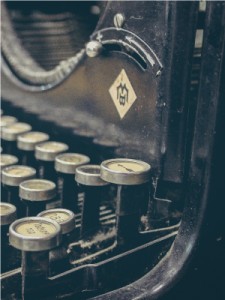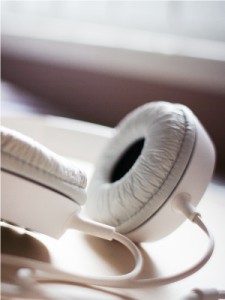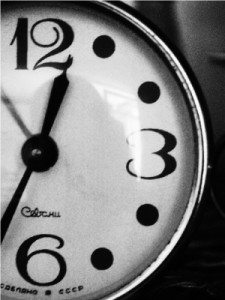One of the most difficult tasks for me to do is writing & sending out cover letters and resumes. Even after I got that ish down to a SCIENCE, it still filled me with a singular, ice-cold dread that was so deep, avoiding the task seemed like the only thing to do.
Because I’m not an independently wealthy heiress, I needed to send in resumes to get a job, so I couldn’t avoid it.
So I got really good at not avoiding it.
Now, as Master of Tricking Yourself Into Focusing™*, I pass that knowledge on to you.
 1. Go somewhere else
1. Go somewhere else
Libraries are great for this, but really, anywhere that is not your house is good. You’d be surprised how much just being in your home makes it easy to waste time. Not only is everything you need right there within your reach, but it also decreases your sense of urgency, which, if you’ve ever had to do a task you hated, is sometimes all that pulls you through.
While we’re at it, when you work at home (even on personal projects), don’t work in your bedroom/bed. In fact, if you can set yourself up in a straight back chair at a table or desk, do that. Being at home sitting on couches puts your body and mind into unwindulax mode. Keeping your sitting position all business keeps you going.
 2. Cut the internet cord (not literally, though)
2. Cut the internet cord (not literally, though)
I try not to be one of those people who’s judgey about the way people spend their time on the internet because I actually think it’s a great mental break space. In fact, I keep stuff like this bookmarked at work.
That said, the internet is a productivity serial killer. It’s so easy to get lost in a Wikipedia hole, or scroll endlessly through Facebook and Buzzfeed. Sometimes, I get stuck on sites I don’t even care about, just to avoid working.
So if you have something you NEED to get done, turn off your internet. Don’t be afraid to get serious, either; if you need to unplug the entire thing, do it.
If you need a less involved solution, try Citrus (or Facebook Nanny, if just Facebook’s your trouble). I also occasionally use an Mac app called Concentrate, which costs $30, but can do a whole bunch of things not just on the web, but on your computer, too, like restricting the apps you can open. Here are some similar apps for Windows. Oh, and here are 19 more to boost your concentration, if you really like app solutions. Applutions.
 3. Get rid of ALL distractions
3. Get rid of ALL distractions
This one might be tough for some people, because it requires doing some things that might make you feel uncomfortable.
The best possible way to make sure you get focused and stay focused is to remove all distractions from your workspace. This means no TV, no phone, turning off all notifications (yes, I mean email), and, if possible, shutting your door or otherwise letting people know you are not available.
If turning off notifications or being away from your phone feels like too much, remember that it’s only temporary. If you need to tell you boss or your mom or your partner or whoever that you’re not checking email for the next hour, do that. As long as they know, an hour is actually a small sliver of time. They won’t even notice.
To up your distraction-free game even more, find your magic sounds. Spotify has a whole focus section, which includes white noise/nature sounds, as well as ambient & classical music. There are also apps online and for your phone. Or, if singing doesn’t distract you (I can only do music with lyrics if I’m doing “mindless” work, like credit card reconciliations), you can use or create a workday playlist.
Whichever you choose, make sure you do two things: 1., get a good pair of noise canceling headphones (these are my favs, and they’re only ~$40), and 2.,do not listen to your “focus” sounds when you are not trying to work, ie – if you listen to rainforest sounds to work, do not listen to them to go to sleep.
 4. Train yourself to focus
4. Train yourself to focus
Here’s why you shouldn’t listen to your “focus” sounds when you’re not working: if you use the certain sounds only when you work, you will train your brain to feel motivated when it hears those sounds. They don’t have to be the same exact sounds every time; for example, if you listen to classical music when you work, classical music in general will become the trigger.
I used Brian Eno’s Music for Airports when I first started training myself to focus. I have never listened to it at any other time than when I am working, and I can work for incredibly (totally healthy) long hours when I have it on.
Besides music, just having a dedicated “workspace” can get you in the focusing mood. If somewhere in your house is for work, and only for work, just being there will have the same effect as the sounds.
If you really want to get Pavlovian, try this: when you are working and focused and feeling motivated, gently pull on your ear, or some other non-harmful physical act. Do it every time you’re in the zone. Every single time. After a month or so, you should be able to do that physical action whenever you need to focus, and you should feel motivated. The real key to this one is wanting it to work; if you go into skeptical, or not into it, you’ll negate the mind-over-body stuff this needs to work.
 5. Just do 5 minutes
5. Just do 5 minutes
If you’re really avoiding a task, start by just doing 5 minutes. Set a timer if you need to. Most of the time, you’ll want to keep working past 5 minutes, and you won’t need to break or anything. But if 5 minutes is up, and you’re like, “I’m done”, then be done. Take a break, or switch to a different task.
Then, do it again. Keep doing it till the task is done, or until you are doing more than 5 minute intervals.
For more structured time management, there’s the Pomodoro Technique, which uses 25-minute intervals. You can also try setting up your own intervals, or you can try what I call The Genius Method.
Research of highly accomplished, focused people has shown that they all pretty much do the same thing: over the course of a day, the work no more than 4 1/2 hours, split up into three 90 minute intervals, with breaks in between, including a 20-30 minute afternoon nap. I’ve found that 90 minute intervals really are the best chunk of work time, even if you do different tasks within those 90 minutes (so, maybe, just tackling your to do list for that time).
Oh, one last thing: don’t use your time between intervals to check all your “distractions”, like your phone or email. At most, use the break to check your messages, but don’t respond. That way, you can assuage your fears without getting off track.
Do you have a favorite way to get & stay focused? Share it with me!
* – not really ™. Back up ?